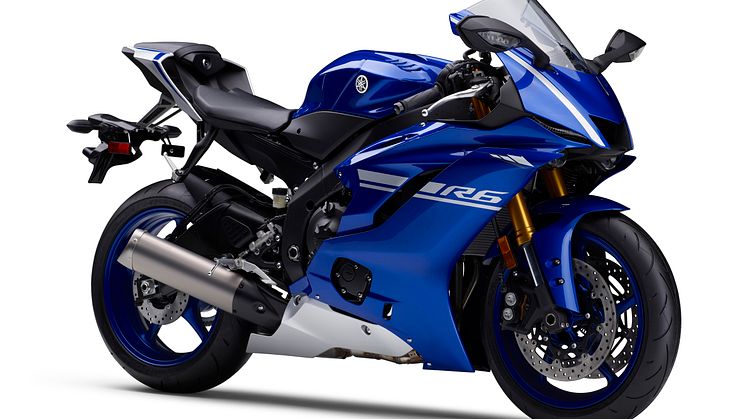
Press release -
Yamaha Motor Launches MY2017 YZF-R6 in North America -Next Generation in Supersport 600cc High Performance-
IWATA, October 14, 2016-Yamaha Motor Co., Ltd. (Tokyo: 7272) announced today the March 2017 North American launch of the 599cm3-capacity Supersport YZF-R6, the first major model change in nine years. Bringing with it the proven features of excellence in circuit performance and exemplary performance on winding roads, this new model takes riding performance to the next level and embraces the R-series styling.
The new model
YZF-R6 now includes 1) ABS and TCS (Traction Control System), which allows the bike to utilize drive from the rear wheel more efficiently during acceleration, 2) high performance suspension and brake parts, 3) a lightweight aluminum fuel tank, and 4) a new, slim CF magnesium die-cast rear subframe. “Next generation R-DNA” is expressed through a design in which the vehicle body works in harmony with airflow.
Even higher sports performance is achieved through incorporating vehicle body parts and control technology created during the development of the
YZF-R1, and ensuring thorough overall balance. The enjoyable new dimension in handling brings out the best in the rider’s performance.
The world première of this exciting new model was held on October 13 at the AIM Expo (American International Motorcycle Expo) in Florida, U.S.A.
| Model | Launch Date | Recommended Retail Price | Target Sales |
| 「YZF-R6」 | March 2017 | 12,199 US dollars | 4,000 units (first full year from time of release, North America) |
New Features
1) Traction Control System
Adoption of the TCS (Traction Control System) provides a means for extracting more efficient drive force from the rear tire during acceleration. If signs of rear wheel spin are detected during takeoff etc., smoother acceleration and handling are supported by the integrated control of ignition timing, fuel injection volume, and throttle valve opening. There are six selectable levels of intervention depending on the riding environment, tire grippiness, and rider preference.
2) Incorporation of parts the same type as on the YZF-R1, such as front forks
Upside-down suspension has been adopted with a 43mm diameter inner tube replacing the current 41mm front forks. The front fork is the same type as the one on the YZF-R1 and uses specific settings to provide good damping force and a planted feel from the front. The same type of parts as the YZF-R1 have also been utilized in the front brakes. The disc has a 320mm diameter and the aluminum 4-pot opposed-piston monobloc calipers (2-pad type) are paired to a Nissin radial master cylinder. (Current disc is 310mm diameter)
3) Aluminum fuel tank defined by advanced manufacturing technology
Continuing from the YZF-R1, a lightweight aluminum fuel tank (17ℓ) has been adopted. Its shape has deep knee pockets to suit quick movements from the rider. Compared to a steel fuel tank, it provides weight savings of approx. 1.2 kg (vs. the current YZF-R6). Although bending and shaping aluminum to create a fuel tank with complicated contours such as these knee pockets proved to be a challenge as aluminum’s characteristics as a metal make this difficult to achieve, post press CMT (cold metal transfer) welding technology has been used with this model and highly-skilled craftsmen complete the welds and finish by hand, resulting in strong, tightly-sealed welds and a beautiful exterior appearance.
4) New seat and slim rear subframe to support the rider’s actions
The seat and rear subframe have been newly designed. The top surface of the seat has a gentler upward slant, while the portion around the rider’s thighs has more freedom for a good feeling of fit and leg reach to the ground. In conjunction with the benefits of the new tank, the improved seating position provides for an enhanced level of agile maneuverability. The magnesium rear subframe supporting the seat maintains the strength and rigidity of the current model while being approximately 20mm narrower in width.
5) Highly-aerodynamic new front fairing design
The adoption of a newly-designed front fairing and windscreen provide an 8% improvement in aerodynamic efficiency (less drag) over the current model. This contributes to a higher top speed during track riding.
6) New styling that exudes “A futuristic look and feel that is strong, striking, and sentient”
The key styling phrases for this model have been 1) Conveying the next generation of R-DNA, 2) A futuristic look and feel that is strong, striking, and sentient, and 3) Pure entertainment, be it on the track or on the street. Features like the newly-shaped LED position lights give the front face a glaring appearance.
7) Quick Shift System (QSS) for smooth upshifts (optional)
A Quick Shift System (QSS) is now optionally available to help provide fast, smooth upshifts. When the switch positioned on the shift lever rod detects motion at the gearshifter pedal, it adjusts engine output according to ECU calculations and instantly cancels out the drive torque of the engaged gear to promote a swifter shifting of gears. It is the same mechanism used on the current YZF-R1.
Features Continued from Current Model
Forged aluminum pistons■Titanium intake/exhaust valves ■Air Induction System and Yamaha Chip Controlled Intake (YCC-I)■Twin-injector Yamaha Chip Controlled Throttle (YCC-T) ■Slipper clutch■Close-ratio 6-speed transmission■Magnesium head and case covers■EXUP exhaust valves■Titanium exhaust silencer■Aluminum frame (delta box)■Aluminum swing arm
YZF-R6 2016 US Model Main Specifications
| Overall length x width x height | 2,040mm × 695mm × 1,150mm |
| Seat Height | 850mm |
| Wheelbase | 1,375mm |
| Weight | 190kg |
| Engine Type | Liquid-cooled, 4-stroke, DOHC, 4-valve |
| Cylinder Arrangement | In-line 4-cylinder |
| Total Displacement | 599cm³ |
| Bore x stroke | 67.0 x 42.5mm |
| Compression ratio | 13.1:1 |
| Maximum Output | NA |
| Maximum Torque | NA |
| Starter system | Electric |
| Fuel Tank Capacity | 17L |
| Fuel supply | Fuel injection |
| Tire Size(Front/rear) | 120/70ZR17 / 180/55ZR17 |
Topics
Categories
Yamaha Motor (TOKYO: 7272) is a world-leading producer of motorcycles, marine products, power products, industrial machinery and robots. The company’s diverse business and wide variety of products are built around its proprietary technologies focused on small engines, fiberglass-reinforced plastics and electronic control. Yamaha Motor conducts global development, production and marketing operations through 140 subsidiaries and equity-method affiliates in 30 countries. About 90% of consolidated net sales are generated in more than 200 countries outside of Japan. The company is steadily restructuring its global engineering, manufacturing and marketing capabilities for sustainable long-term growth. Please visit http://global.yamaha-motor.com.
